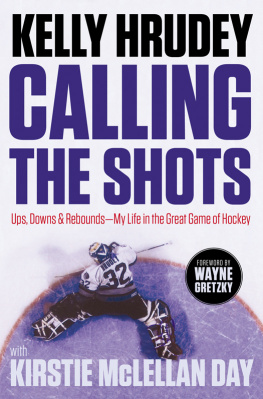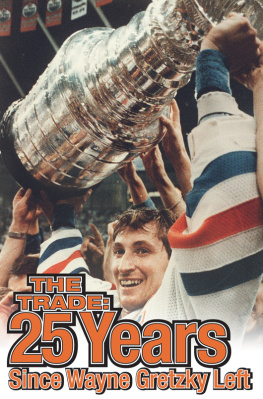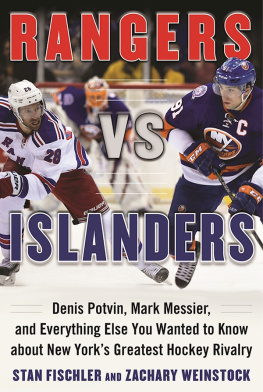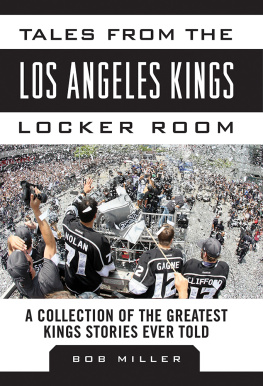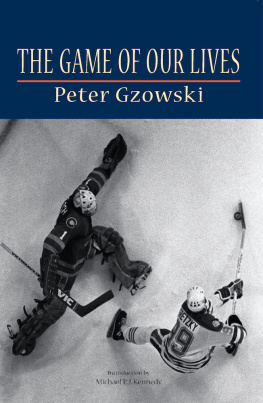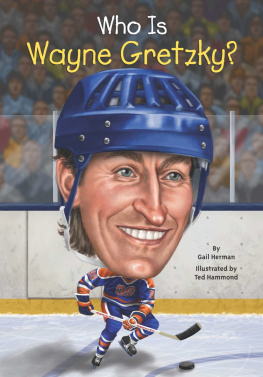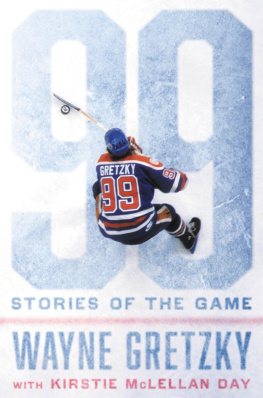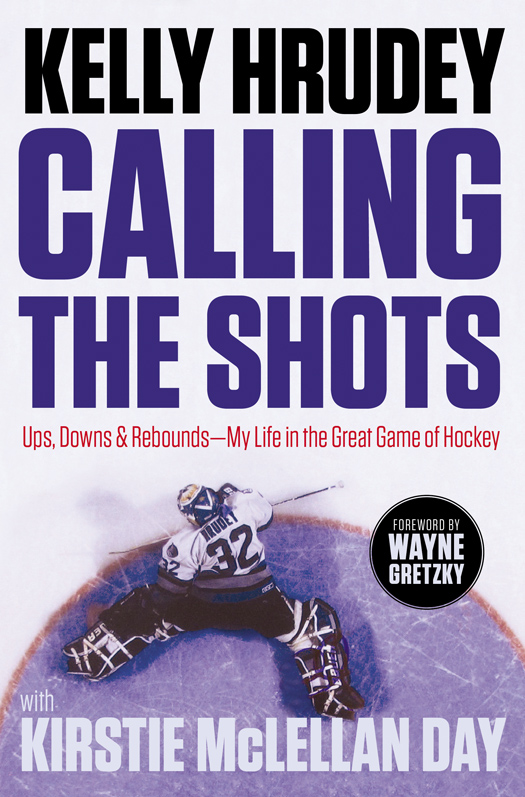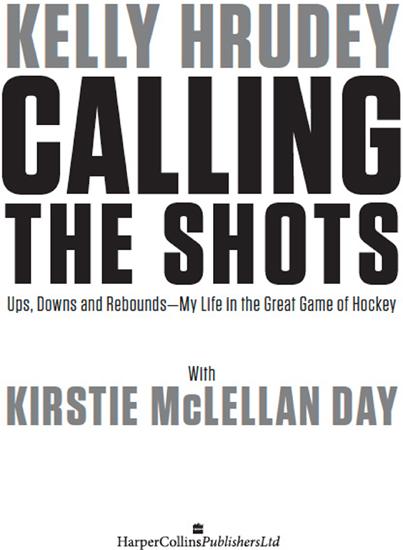THE GAME OF HOCKEY IS SUCH a unique sport. So many of us come together from all over the world with the hope that one day well be able to play in the National Hockey League.
Its fairly well known that goaltenders are a little different from forwards and defencemen. But for some reason, I was lucky enough to play with some great goalies who were not like that at all. Guys like Grant Fuhr, Mike Richter and, of course, Kelly Hrudey, just to name a few.
I first got to know Kelly during the 1987 Canada Cup. I was with the Oilers and he was with the Islanders. I remember that he was immediately one of the most well liked players at training camp. Besides taking shots day in and day out, he was always the last guy off the ice. On top of that, he gave his input at the penalty-kill and power-play meetings. Seeing those plays through a goalies eyes really helped us.
A few years later, when Kelly was traded to the L.A. Kings, he gave us a real boost of energy on the ice. And he was like a captain off the ice, never shy to get into another players face, whether it was me, Rob Blake or a fourth-line centre. But he always did it in a classy way.
Kelly wanted what was best for the team, and in the 1993 playoffs, that came through loud and clear. Early on, during rounds one and two, Kelly, who was our number one goalie, split some of the games with our backup, Robb Stauber. But Kelly didnt make a big deal out of it. His focus didnt change one bit. When he wasnt playing, he still practised harder than anyone and showed the same strong leadership he always did.
When it came to round three, where we faced Toronto, he never faltered. He took the bull by the horns and helped us win the series in seven games. That meant we were going to the Stanley Cup Final. In my opinion, there was no one more deserving than he was.
Unlike a lot of goalies who like to keep to themselves, Kelly had great flair. The L.A. fans loved him. He was a huge fan favourite. They loved the rebel, the defiant player whose trademark was a ripped piece of blue underwear that he wrapped around his head to keep the sweat out of his eyes. I always got a kick out of seeing the fans in the stands wearing blue bandanas.
We were all proud to be Kellys teammates, and Im sure he will give all you fans a wonderful insight into hockey and the lessons he learned in his everyday life.
Enjoy the book,
Wayne D. Gretzky
IVE ALWAYS LOVED THE GAME of hockey, from when I was young. I spent hours and hours in our basement with my older brother, Ken, playing ball hockey. And I was glued to the television watching Hockey Night in Canada on Saturday nights. I had trading cards back thenall the Toronto Maple Leafs and all the Montreal Canadiens. I put those players on a pedestal. They were my idols. Guys like Jean Bliveau.
When I played for the Islanders, and then the Kings, and then the Sharks, Id see him up in the stands at the Montreal Forum. I remember thinking, Wow, wouldnt it be something to become a man like Jean Bliveau? He was a great presence. So elegant-looking in his beautiful tailored suits with that head of perfectly combed thick white hair. People throw around the words hockey royalty all the time, but he really was the king, and here he was, watching me play. I mean, how cool is that?
And Bobby Orr. He became an agent once he was done playing, and I had just gotten into broadcasting when I saw him standing at the Zamboni entrance in Florida. The Panthers were on the ice for a morning skate and he was all by himself. It took a lot of courage for me to go up and introduce myself. Much to my surprise, he knew my name! It was like, Oh my God, Bobby Orr knows who I am. A thrilling moment. We had a really nice chat, but I cant recall exactly what we talked about because I was so in awe. He reminded me of some of the greats by how humble he was.
Today, I am part of a brotherhood that started with guys like Orr and Bliveau and those before his time, like Georges Vzina. These are the guys who laid the foundation.
I never expected to play in the National Hockey League. Ever. And yet I had the privilege of playing in New York under Al Arbour, one of the greatest coaches in the league, and in Los Angeles with Wayne Gretzky, the greatest player ever to play the game. I played with some of the smartest, funniest most talented teammates at a time when I think hockey was at its most exciting.
I always read the game-day press notes. Id look at how many years a player had under his belt, and Id say, How can a guy play twelve years or more in this league? And then one time, I was in the dressing room getting ready for a game in L.A.Id been in the league around eight yearsand I recall going, You know what? I think Im gonna be one of those guys. One day the press notes are going to list my name, my age and how many years Ive played in the NHL, and its going be north of ten years. Well, it turned out to be a fifteen-year ride.
Fifteen years of hard work, dedication, will and passion. Fifteen years full of love, support and loyalty. Fifteen years of ups, downs and rebounds. The highest of highs and the lowest of lows. That wave of emotion after a game is something most people never get to experienceanger, jubilation, frustration, satisfaction. But there was always one constantpride. Every time I pulled on my jersey, I was proud to be a player in the NHL. I still am.
FIRST TIME I MET ISLANDERS COACH Al Arbour, I was petrified. You know that feeling when you touch a bad plug? Electricity zips around your cells and somehow ends up leaving this awful feeling in your teeth. I was nineteen years old and intimidated for sure.
Al was old-school hockey. A very tall man. I was about five foot ten and still growing, and he was about six feet. But he had so much presence he looked about eight feet tall. He was a big and powerful guy. He wore thick black-rimmed glasses, which made him unique. When he was thinking, hed pull them off and run his hand through his thick black hair. Hed put his glasses back on and youd see these Brylcreem fingerprints.
Early on in the league, coaches were dictatorial. There was one way, and either you did it that way or you were on the bus to the minors. Simple as that. Prior to 196768, there were only six teams and an abundance of players, which meant fewer jobs and a lot of guys chasing them. Whether or not players liked what the coach was telling them wasnt really a factor.
Al was like a stern father figure who knew when to give you a kick in the butt and when to pat you on the back. He knew what you needed wasnt always what you expected. Sometimes you thought you were going to get one and youd get the other. He kept you off guard. He wouldnt tell you that he used psychology, but he did.
Geezus, Im getting emotional just thinking about him. I loved the man. He was the first guy I met in hockey who really cared about people. I mean at that pro level. No, I gotta take that back because my Indianapolis Checkers coach, Fred Creighton, was a beautiful man to me in the minors. Fred cared just as much about developing guys for the NHL as he did about winning the league championship.
Al tried to make a real connection with all of us. He did that by treating us all differently. Of course, there were some players he never reached. It doesnt work out every time. But he went beyond just the Xs and Os. As an example, the way he treated Denis Potvin was a lot different than the way he treated me. When Potvin first joined the Islanders, Al Arbour was tough on him. Denis was drafted number one overall, and he performed magnificently right from the first day he stepped into the league. He was a guy that all the New York press praised, saying how great he was. As a result, many times Al had to drive home the point to Denis to get his ego get out of the way.

